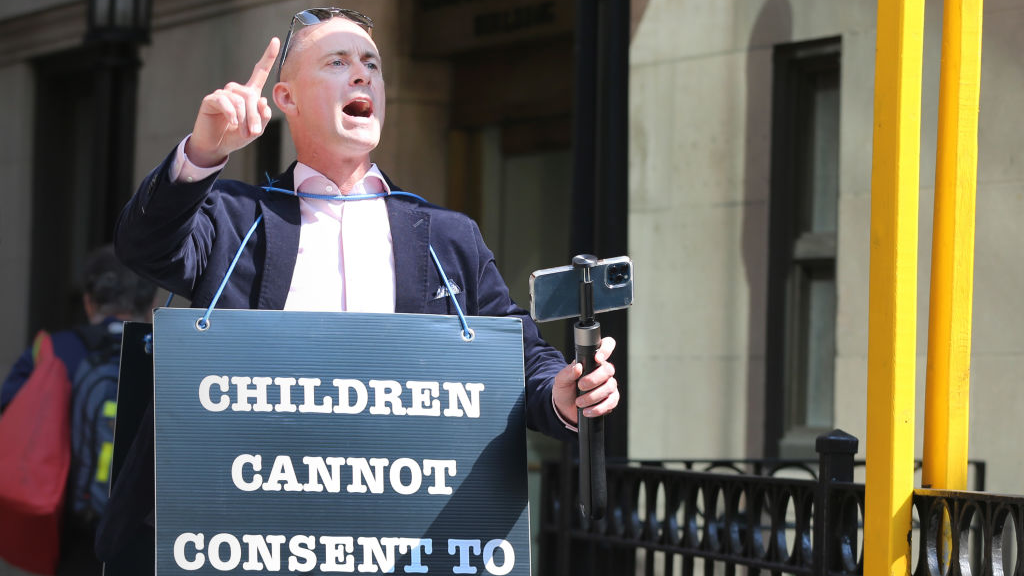A prominent Canadian free speech advocate, known as Chris Elston or “Billboard Chris,” has recently gained attention for his confrontations with Australian authorities regarding freedom of expression. Elston was fined $806 for allegedly obstructing public movement while advocating against puberty blockers for children. His situation has garnered international attention, especially following a supportive statement from the U.S. State Department, emphasizing the need to protect freedom of expression globally.
| Article Subheadings |
|---|
| 1) Background of the Incident |
| 2) Legal Challenges Faced by Elston |
| 3) Support from U.S. Officials |
| 4) The Broader Implications |
| 5) Perspectives on Freedom of Speech |
Background of the Incident
The conflict began when Chris Elston displayed a billboard stating, “children cannot consent to puberty blockers,” while engaging with members of the public. This act took place in Australia, where authorities issued a “move on” order to Elston, claiming he was obstructing public movement. Despite peacefully conversing with onlookers, he was subsequently issued a fine amounting to $806. The incident raises questions about the limits of free speech, especially regarding sensitive societal debates surrounding children’s rights and medical interventions.
Legal Challenges Faced by Elston
In April, Elston initiated legal action against Australia’s eSafety commission after his tweet, which contained a link to a Daily Mail article discussing a transgender activist on an Australian board, was removed. He described the experience as an overreach of authority.
“It’s such a zealous overuse of authority,”
he expressed, highlighting the importance of allowing citizens to freely express their opinions. This legal battle reflects a growing concern over state censorship and its impact on democratic freedoms.
Support from U.S. Officials
The plight of Elston caught the attention of the U.S. State Department, which made a public stand against government censorship. In a tweet, the State Department addressed the alarming trend of governments coercing tech companies to restrict free speech. They stated,
“Freedom of expression must be protected – online and offline,”
underscoring the need for consistent advocacy for rights across the globe. The U.S. government has also cited numerous instances of overreach by various nations stifling dissenting voices.
The Broader Implications
Elston’s case exemplifies a growing global trend where authorities appear to overextend their reach into personal freedoms. Many believe that limitations on free speech can pave the way for broader societal issues, including intolerance and suppression of debate on vital issues. EU Commissioner Thierry Breton, for instance, threatened social media platforms over political speech, and other nations have enacted laws curbing discussions around controversial topics such as gender ideology. This trend raises concerns about the future of democratic societies and the individual rights enshrined within them.
Perspectives on Freedom of Speech
The significance of Chris Elston’s situation extends beyond his individual circumstances. Freedom of speech advocates, including representatives from organizations like Alliance Defending Freedom International, argue that everyone has the inherent right to express their truths. Lois McLatchie Miller, a spokesperson for the group, stated that Elston represents a broader struggle against censorship. She highlighted how similar censorship tactics are being utilized in other Western nations, including the United Kingdom, where individuals face serious consequences for expressing their opinions on pressing social matters.
| No. | Key Points |
|---|---|
| 1 | Chris Elston was fined for displaying a billboard advocating against puberty blockers. |
| 2 | He has initiated legal action against the Australian government for censorship. |
| 3 | The U.S. State Department has publicly supported Elston’s right to free speech. |
| 4 | There is a growing trend of government censorship affecting open discourse globally. |
| 5 | Freedom of speech advocates argue that open dialogue is critical for democracy. |
Summary
The ongoing situation surrounding Chris Elston reflects a critical juncture in the global discourse on freedom of expression. As governments increasingly resort to censorship, advocates like Elston emerge as crucial voices in the fight against the overreach of authority. The response from the U.S. State Department signifies a broader commitment to ensuring that individual rights are protected, fostering hope for increased advocacy against censorship worldwide.
Frequently Asked Questions
Question: Who is Chris Elston?
Chris Elston, also known as “Billboard Chris,” is a Canadian free speech advocate recognized for his public demonstrations advocating against puberty blockers for children.
Question: Why was Elston fined by Australian authorities?
He was fined $806 for allegedly obstructing public movement while attempting to engage in conversations with the public while displaying a controversial billboard.
Question: What support has Elston received from international entities?
The U.S. State Department publicly supported his right to free speech, pointing out the troubling trend of government censorship globally.
